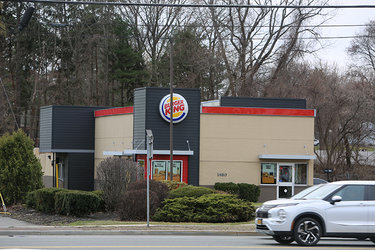Burger King sues Guilderland
GUILDERLAND — In a lawsuit recently filed against Guilderland, a fast-food franchisee claims the town is on the hook for its hefty contractor bill and revenue loss caused by flooding in an area of town long known for washouts.
The March 17 complaint from Carrols LLC, owner of over 1,000 Burger Kings in 23 states, claims Guilderland is owner of, and therefore responsible for, a 36-inch corrugated metal pipe (CMP) running under its Western Avenue location, across the street from Stuyvesant Plaza, and that the pipe’s failure caused significant flooding and erosion on the property, which forced the closure of its drive-thru service and resulted in financial losses.
The six-month drive-thru closure resulted in a $400,000 revenue loss, the company claims, while repair of the pipe and pumping of the accumulating stormwater cost over $1 million.
Carrols asked that the court “enter judgment in its favor against the Town of Guilderland for the reasonable costs to repair the failed 36-inch CMP, the reasonable costs associated with safely pumping and removing the stormwater from the flooded depression, and its loss of income.”
In response to a request for comment, Supervisor Peter Barber wrote, “Because the matter is in litigation, I have no comment at this point except to note that the Town denies liability for all claims and damages alleged in the complaint.”
The town, in its March 28 response to Carrols, said that it didn’t own, control, or maintain “the subject pipe and is not a proper party to this lawsuit.”
This is the second recent lawsuit filed against the town over stormwater issues in the area. In October, a McKownville couple sued, claiming the town’s negligence in maintaining its stormwater management system resulted in significant property damage and potential structural harm to their Glenwood Street home.
Elliot and Adrienne Haase claimed that, in July 2023, their basement was flooded with four feet of water due to unresolved issues in the stormwater system, and alleged that subsequent weather events following the July incident continued to exacerbate the damage. The Haases’ suit is ongoing.
History of flooding
Guilderland is also well aware of the issues it has with stormwater in McKownville. The town in November requested and received from its industrial development agency $50,000 to help defray some of the $500,000 it will cost to review flooding on Route 20.
The stretch of Western Avenue running in front of Stuyvesant Plaza has for years been plagued by chronic flooding, on occasion leaving plaza customers and employees stranded for hours, Barber wrote to the IDA in his request at the time.
He wrote, “The cause of this flooding is the tremendous amounts of stormwaters from a wide area (about 860 acres) that flow into the Town-owned McKownville Reservoir between Route 20 and Stuyvesant Plaza.”
The reservoir’s limited capacity, according to Barber, “is insufficient to hold the stormwater from the increasing frequency and force of storms.”
Guilderland identified as part of the problem state-owned culverts under Western Avenue as not being sufficient enough to handle the flow from the “highly-urbanized” 860-acre watershed — which encompasses Crossgates Mall and Crossgates Commons and the New York State Thruway, as well as other privately- and publicly-owned area properties — approximately 90 percent of which is located “upgradient,” or uphill of Stuyvesant Plaza.
The problem, according to Barber’s memo, has been exacerbated by an additional 800-foot stretch of undersized culvert located on private property between Western Avenue and an open channel that directs stormwater under McKown Road, eventually flowing into the Hudson River.
Carrols’ complaint
The Carrols’ complaint states that, in December 2023, a “flooded depression,” or a sunken area — which initially measured about 4 feet by 4 feet, but grew, substantially, to 82 feet in length, 26 feet in width, and 8 feet in depth — appeared on Carrols’ Burger King property.
A month later, the depression expanded, which prompted a town investigation and forced Carrols to close its drive-thru, the court filing states; the investigation suggested the failure of a 36-inch corrugated metal pipe carrying Guilderland’s stormwater caused the soil to erode.
During a January 2024 meeting, the complaint states, Guilderland denied ownership and responsibility for the failed stormwater pipe. Despite the denial, according to the filing, Carrols worked with the town to secure repair permits.
By March, erosion caused a dramatic expansion of the depression, court papers state, and Carrols started pumping the water at its own expense.
In the ensuing months, it was determined, following a visual inspection, that the corrugated metal pipe was the cause of the problem, which Guilderland for a second time denied owning.
The town was served a notice of claim within the required time period, the filing states, repairs were eventually made, and the drive-thru reopened.
Carrols makes four claims in its complaint against Guilderland:
— Unjust enrichment: The town benefitted from Carrols’ repair of the stormwater system but refused to contribute to project cost;
— Nuisance: The town’s failure to address the stormwater issue disrupted Carrols’ business;
— Trespass: The uncontrolled stormwater from Guilderland’s system damaged Carrols’ property; and
— Failure to maintain an easement: Guilderland neglected its responsibility to maintain the drainage system, which resulted in damages.
For this, Carrols is seeking a $1 million reimbursement for having to pump the stormwater and repair part of the system. With no drive-thru for six months, the company is also seeking lost-income compensation, about $400,000.



